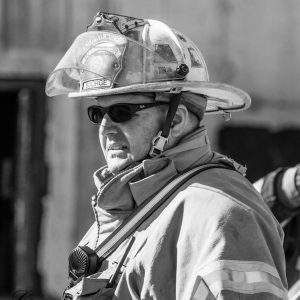Do you think your agency and its members are struggling with mental health and wellness, resilience today? Before you get defensive, consider some more specific questions that can help you identify firefighter wellness warning signs:
- Do you see an environment of negativity in your stations?
- Are people up at all hours?
- Is your staff complaining about stress, or problems with their home life?
- Is your leadership struggling to manage challenges equitably and objectively because of their own struggles at work or home?
- Has your department responded to a series of traumatic emergencies lately?
- Do you know members who drink too much alcohol?
- Have you seen an increase in sick leave usage? Do you have a lot of firefighters out on leave for post-traumatic stress?
- And if you’re in a volunteer agency – do you have members who don’t show up for calls?
It’s easy to say “we’re fine.” But if you’re genuinely willing to look, you’re likely to see symptoms that not everything is perfect. The fire service has taken huge strides in recognizing the importance of member wellness. At the same time, every fire department across the country has room to improve.
In our previous article, we discussed reducing firefighter exposure to trauma on the job. That’s critical – but it’s only one-half of the equation. Your personnel come to you with their own set of personal experiences and challenges. They may bring with them financial strain, relationship issues, substance use disorders, or other elements that impact their resilience and how they process job-related stress. While these are not necessarily elements leaders can control, they underscore how important it is to be aware of whether members are struggling.
Following are four critical areas for identifying wellness warning signs in firefighters.
Want to know more about Cordico, Lexipol’s wellness solution?
CLICK HERE!
#1: Sleep
Career or volunteer, being in the fire service is challenging for sleep. Whether it’s shift work or the pager going off overnight, it’s often difficult for firefighters to get 7 to 9 hours of good sleep on a regular basis. Certain elements—such as having young children or being assigned to a busy station—can exacerbate the problem.
It’s imperative that leaders not just write off lack of sleep as a normal part of the job. Not getting enough sleep has a direct impact on how your firefighters perform their jobs – and in turn, how they react to trauma. And while sleep may always be challenging, there are warning signs that you can be watching for in your crew members that indicate they are not getting the adequate sleep they need to be the best firefighter they can be.
Financial stress is incredibly common and incredibly powerful. In first responders, it is a frequent contributor to suicidal ideation.
Lack of sleep often manifests itself in mood changes. If a firefighter is negative and cranky and irritable, it could be a sleep issue. Appetite is also affected. Firefighters who have weight control issues or who are always eating junk food may be trying to compensate for lack of sleep. They may be reluctant to train as they fight a lack of energy. Problems with memory, cognitive reasoning and decision making are also common side effects. Pay attention to their physical presentation; at times, it’s evident when someone isn’t getting enough rest. Are they relying too heavily on caffeine as a pick-me-up?
In career departments, you may even notice firsthand sleep patterns that are clearly affecting their quality of rest. Are they snoring loudly? Conversely, are they not sleeping— up at 2 am, working out at odd hours? Playing video games or watching TV too late?
All of these are warning signs of inadequate sleep, which can lead to decreased resilience and productivity among firefighters, undoubtedly a significant concern for any leader.
#2: Financial Wellness
When Firefighter Blaine rolls into the station parking lot with a big new big truck, our first instinct is probably to congratulate him. But sometimes, big purchases can be an attempt to self-medicate. Especially in career departments with mandatory overtime, firefighters exhausted by the extra hours may determine they “deserve” a new toy. Unfortunately, the payments associated with the new toy may create the obligation to continue racking up the OT, even if it’s not mandated.
Financial stress is incredibly common and incredibly powerful. In first responders, it is a frequent contributor to suicidal ideation. Firefighters dig themselves into a financial hole and see no way out.
We can only help if we watch for the warning signs. Of course we’re not going to second-guess every purchase, but take note when firefighters:
- Talk about difficulty paying bills or the mortgage
- Are going through a divorce, which can affect both current expenses and retirement planning
- Suddenly need a ride to work (this can be a sign that their car was repossessed)
- Stop contributing to station meals
- Move into a much more expensive area
- Constantly ask for overtime and say they “need” it
- Cram their off days with secondary employment
It’s important to recognize these indicators as potential financial strain, which we know can have significant implications on the well-being and performance of employees.
#3: Relationships
Personal relationships are another big source of stress that, without proper management, can affect firefighter resilience. And relationships are inherently more challenging for firefighters than people in “9 to 5” office jobs. Shift work, callbacks, the intensity and camaraderie of the work all put strain on romantic relationships, more so if children are involved. Adding to the complexity, firefighters with post-traumatic stress are likely to have relationship issues.
Before you get defensive, consider some more specific questions that can help you identify firefighter wellness warning signs.
Ask any company officer and they will be able to pinpoint the firefighters who have challenging family lives. They frequently complain about their partners or other family members. They receive phone calls that frequently turn argumentative or just plain don’t look or sound pleasant. They may have family members who show up at the station unexpectedly. They may avoid going home, choosing to linger at the station or hit the bar after shift. And when they get back on shift after having been at home, they don’t seem rested or rejuvenated.
These are all signs that firefighters may not be managing their relationships effectively. And that added strain will eventually impact their service, whether it comes in the form of “snapping” at a patient, a lack of focus or attendance at work, or getting involved in an inappropriate relationship with another firefighter.
#4: Physical Health and Nutrition
Like sleep, physical health affects so much. Without good health and nutrition, your firefighters will be able to do less on the fireground. They will also be at greater risk for long-term health concerns such as sleep apnea, cardiac issues or cancer.
Being significantly overweight or obese is an obvious warning sign, but don’t assume normal-weight firefighters are physically healthy. Look for other signs, too. Do you have lots of members using sleep apnea machines? Are people smoking or vaping outside the station? What kind of food is in the firehouse fridge? When firefighters eat together, are they eating the meals of 40 years ago? Volunteers, what are you eating on volunteer night? Do your members go out for a high-sugar, high-fat breakfast before Saturday training?
Alcohol is another huge issue. Following shifts or training night, do your firefighters go straight to the bar? Do they talk about getting drunk all the time? Do they show patterns of calling in sick on their “Monday?”
Injuries can also be a sign of poor physical fitness. Are your people constantly getting hurt? How many of your firefighters have had heart attacks or cardiac issues?
Indeed, all these are indications of deteriorating physical health, and maintaining good physical health is crucial for firefighters. Given the physically demanding nature of their job, we all know firefighters must be in top physical condition to efficiently perform their duties.
Are You Paying Attention?
There are some serious mental and physical demands made on individuals when they become a firefighter, including exposure to traumatic stress. Part of reducing the impact of those physical demands, as well as the trauma exposure inherent in firefighting, is to help our people be as healthy – physically and mentally – as possible. Fire service leaders – from the chief to the company officer – must understand firefighter wellness warning signs. When we’re attuned, we will likely see no shortage of these signs. That can be scary. But it’s also the first step in understanding how we can help address the issues causing firefighters stress outside the job – so they are ultimately more prepared to deal with what they encounter when they’re on duty.





